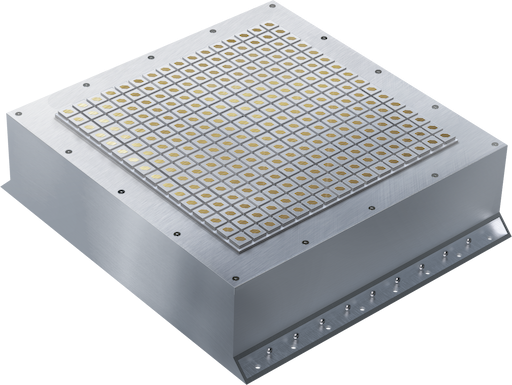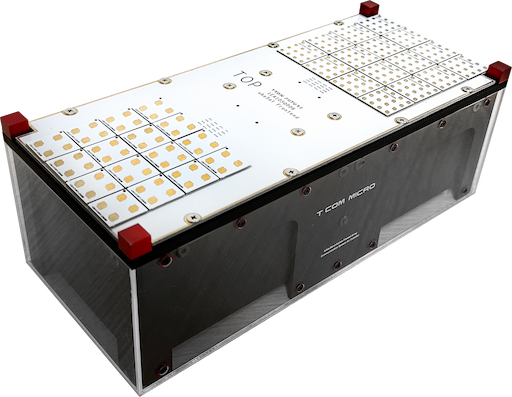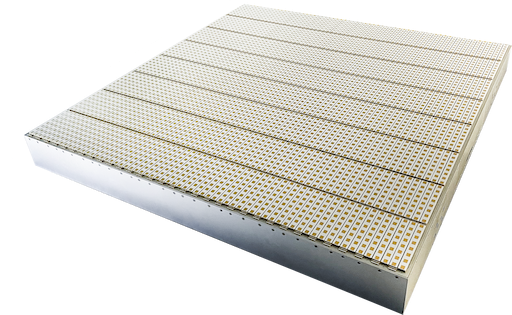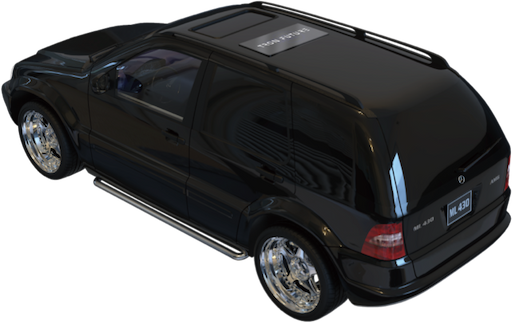Solution – Space Tech
Space Tech
Since SpaceX, OneWeb and other companies started to launch a large
number of LEO satellites, high-speed LEO satellite communication has
been gradually emphasized recently. Tron Future Tech is committed to
using AESA technology in related communication equipment. Currently,
the products in related fields include Transmitter, SAR, CubeSAT
payload, etc. More diversified communication equipment including
transmitter and receiver are under continuous development.

T.SAR
T.SAR is a 5m x 0.8m, 200kg weights X-band satellite synthetic
aperture radar that operates in LEO. It is an all-weather active
remote sensing system commonly used for environmental and
disaster observation.It achieves High Resolution and Wide Swath
through four digital multibeam.
T.SpaceHub Mini
T.SpaceHub Mini is a high-speed X-band phased array transmitter
for the LEO satellites. It offers CCSDS compliant QPSK / 16APSK
(configurable) modulated downlink signal operating in the EESS
band and enables your satellites to maximum 800 Mbps downlink.
T.SpaceHub Micro
T.SpaceHub Micro's main mission is to do the technical
verification and education training on a 6U CubeSat. T.SpaceHub
Micro offers BPSK / QPSK / 8PSK / 16APSK (configurable)
modulated downlink signal operating in 18 ~ 19GHz which EIRP is
more than 68 dBm and BPSK / QPSK modulated uplink signal
operating in 28 ~ 30 GHz.
T.SpaceRouter
T.SpaceRouter is an ultra-thin, lightweight SatCom user terminal
based on AESA technology. T.SpaceRouter operates in Ka-band
frequency range and supports up to 250MHz instantaneous
bandwidth and 16APSK / QPSK / BPSK modulation (configurable).
The maximum EIRP is over 36 dBW, while the total power
consumption is less than 100 W.
X-BAND TRANSMITTER
T.SpaceHub Mini
T.SpaceHub Mini is a high-speed X-band phased array transmitter
for the LEO satellites. It offers CCSDS compliant QPSK / 16APSK
(configurable) modulated downlink signal operating in the EESS
band (8025 ~ 8400 MHz) and enables your satellites to maximum 800
Mbps downlink.
T.SpaceHub Mini also consists of redundant units including PDU (Power distribution unit), DPU (Data processing unit), and modulator in a compact size. It operates in DC 28±6V and provides EIRP > 58dBm with a total power consumption < 140W.
A user-friendly RS-422 interface will provide a functional remote monitor & control. The product is an integrated phased array solution that can easily scale up the array size to meet customers' demands, and users do not need to seek discrete components like antenna to build up a communication system.
T.SpaceHub Mini also consists of redundant units including PDU (Power distribution unit), DPU (Data processing unit), and modulator in a compact size. It operates in DC 28±6V and provides EIRP > 58dBm with a total power consumption < 140W.
A user-friendly RS-422 interface will provide a functional remote monitor & control. The product is an integrated phased array solution that can easily scale up the array size to meet customers' demands, and users do not need to seek discrete components like antenna to build up a communication system.
| Carrier | X-band |
|---|---|
| Modulation | 16 APSK / QPSK, selectable |
| Roll-off Factor | 0.2 / 0.25 / 0.3 / 0.35 configurable |
| Data Rate | Up to 800 Mbps |
| EVM | ≤ 10% |
| EIRP | ≥ 58 dBm |
| Antenna Polarization | RHCP |
| Dimension (LxWxH) | 293 mm x 293 mm x 100 mm |
| Radiation | TID > 10 krad (Si) |
| Power Input (DC) | 28±6 V |
| power consumption | < 140W |
| Control and Telemetry Interface | UART (RS422) |
| Date Interface | LVDS / SerDes |

CubeSAT Payload
T.SpaceHub Micro
T.SpaceHub Micro contains an 18 ~ 19 GHz TX with 256 antennas and
a 28 ~ 30 GHz RX with 512 antennas for the LEO satellites.
Its main mission is to do the technical verification and education
training on a 6U CubeSat.
T.SpaceHub Micro offers BPSK / QPSK / 8PSK / 16APSK (configurable) modulated downlink signal operating in 18 ~ 19GHz which EIRP is more than 68 dBm and BPSK / QPSK modulated uplink signal operating in 28 ~ 30 GHz.
In order to increase the mission life, it also consists of redundant units to avoid single failure. A built-in self-calibration function lets the reliability of this product has dramatic improvement compared to other LEO CubeSat.
T.SpaceHub Micro offers BPSK / QPSK / 8PSK / 16APSK (configurable) modulated downlink signal operating in 18 ~ 19GHz which EIRP is more than 68 dBm and BPSK / QPSK modulated uplink signal operating in 28 ~ 30 GHz.
In order to increase the mission life, it also consists of redundant units to avoid single failure. A built-in self-calibration function lets the reliability of this product has dramatic improvement compared to other LEO CubeSat.
| Carrier | Ka / Ku Band |
|---|---|
| 18-19 GHz TX 28-30 GHz RX |
|
| Transmit Power | 5W per Cube |
| Size |
Scalable for different size 1U, 2U, etc. |
| Software-Defined | SDR for programmable speed, modem, ECC |

Synthetic-Aperture Radar
T.SAR
T.SAR is a 5m x 0.8m satellite synthetic aperture radar that
operates in LEO and weights 200kg excluding the spreading
mechanism. It is an all-weather active remote sensing system
commonly used for environmental and disaster observation.
T.SAR has 15360 antennas, operates in the X-band, and transmits a peak 4kW RF power (~250MW EIRP) at 5% ~ 10% duty cycle with less than 4000W average DC power consumption. It is composed of 5 synchronized phased array antennas each with a 1m x 0.8m aperture size. It achieves High Resolution ( < 1m) Wide Swath (~500km) through four digital multibeam.
T.SAR has 15360 antennas, operates in the X-band, and transmits a peak 4kW RF power (~250MW EIRP) at 5% ~ 10% duty cycle with less than 4000W average DC power consumption. It is composed of 5 synchronized phased array antennas each with a 1m x 0.8m aperture size. It achieves High Resolution ( < 1m) Wide Swath (~500km) through four digital multibeam.
| Carrier | X-band |
|---|---|
| Weight | 200 KG |
| Dimension (LxWxH) | 3.75m x 1m x 0.1m |
| # of Panels | 3 |
| Power Consumption | < 2500 W |
| PRF | 500 ~ 15k Hz |
| Chirp Bandwidth | 6 MHz ~ 650 MHz |
| Peak Radiated Power | 1875 W |
| Polarization (Single) | HH,VV |
| Polarization (Dual) | HH / HV, VV / VH |
| Power Consumption | < 2600 W |
| Power Input (DC) | 28~34 V |
| Control and Telemetry Interface | UART (RS422) |
| Image Date Interface | SerDes (Aurora) |
| Radiation | TID > 15 krad (Si) |

SPACE ROUTER
T.SPACEROUTER
T.SpaceRouter is an ultra-thin, lightweight satellite
communication user terminal based on active electronically scanned
array (AESA) technology. It is designed to fulfill satcom on the
move requirements and to provide seamless global communication for
connected vehicles.
T.SpaceRouter contains a transmit and a receive antenna, each with 1024 elements, and operates in the ITU Ka-band frequency range (Downlink: 17.8 ~ 20.2 GHz, Uplink: 27.5 ~ 30 GHz). It supports up to 250MHz instantaneous bandwidth and 16APSK / QPSK / BPSK modulation (configurable). The maximum EIRP is over 36 dBW, while the total power consumption is less than 100 W.
A variety of standard interfaces, including RS485, RS422, and RJ45, are provided for ease of integration with automotive connectivity solutions. With the global coverage of satellite communication, T.SpaceRouter is set to unlock the full potential of connected applications for next-generation vehicles.
T.SpaceRouter contains a transmit and a receive antenna, each with 1024 elements, and operates in the ITU Ka-band frequency range (Downlink: 17.8 ~ 20.2 GHz, Uplink: 27.5 ~ 30 GHz). It supports up to 250MHz instantaneous bandwidth and 16APSK / QPSK / BPSK modulation (configurable). The maximum EIRP is over 36 dBW, while the total power consumption is less than 100 W.
A variety of standard interfaces, including RS485, RS422, and RJ45, are provided for ease of integration with automotive connectivity solutions. With the global coverage of satellite communication, T.SpaceRouter is set to unlock the full potential of connected applications for next-generation vehicles.
| (each TX/RX) | 1024 Elements | 2048 Elements |
|---|---|---|
| Mechanical & Power | ||
| Weight | 5 kg | 10 kg |
| Size (cm) | 40 x 30 x 3.5 | 60 x 45 x 3.5 |
| Power Consumption | 100 W | 200 W |
| Tracking | ||
| Beam Switching Time | < 10ms | |
| Scanning angles |
Azimuth 360° Elevation > +30° |
|
| Beam pointing accuracy | 0.3° | |
| Modulation (Configurable) | 16APSK / QPSK / BPSK | |
| Antenna | ||
| Carrier | Ka / Ku Band | |
|
17.8 ~ 20.2 GHz RX 27.5 ~ 30 GHz TX |
||
| Polarization | RHCP / LHCP | |
| Instantaneous bandwidth | 250 MHz | |
| EIRP | > 36 dBW | > 40 dBW |
| Antenna gain | > 30 dBi | |

Markets

Space Technology
Conventional satellite use high gain dish antenna to steer its
communication direction and radar scanning direction. To change
the direction of the antenna, electronic motor is used to rotate
the antenna. Due to Newton's third law of motion, such motion will
creates a reaction in the satellite's motion itself as a
side-effect. Precise positional control is thus required to
further adjust the reaction.
Phased array antenna removes the requirement of electronic motor and its side effect. Tron Future Tech Inc. has actively participated in Taiwan's National Space Program by providing their ultrathin phased array in satellite-to-ground communication transceivers and synthetic aperture radars. We improve our existing solutions to Rad Hard and to survive strong mechanical vibrations during rocket launching process.
Phased array antenna removes the requirement of electronic motor and its side effect. Tron Future Tech Inc. has actively participated in Taiwan's National Space Program by providing their ultrathin phased array in satellite-to-ground communication transceivers and synthetic aperture radars. We improve our existing solutions to Rad Hard and to survive strong mechanical vibrations during rocket launching process.